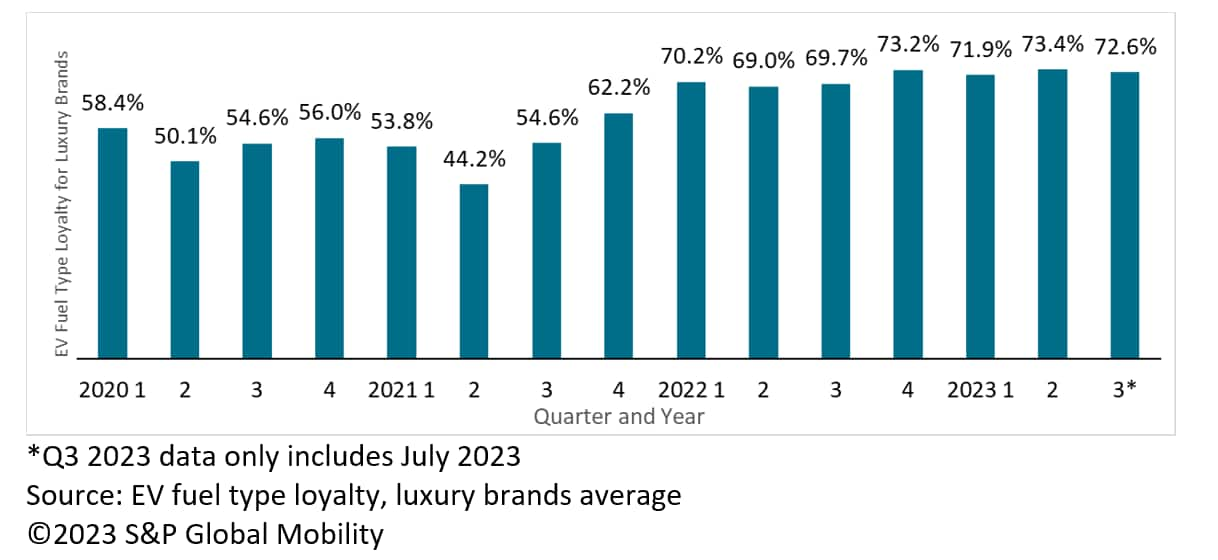[ad_1]
The simple headline is: “3 out of 4 Luxurious EV Households
Follow EVs for Subsequent Automobile.” However take away Tesla’s
industry-leading loyalty numbers from the equation, and the
proportion for the remainder of the {industry} falls off sharply. That
might pose an issue for legacy automakers getting individuals to love
— and keep loyal to — electrical autos.
On the plus aspect, total loyalty by gas sort for EVs amongst luxurious
and mainstream manufacturers collectively has soared prior to now three
years, based on S&P World Mobility registration knowledge. However
the info additionally tells a sobering story: <span/>Practically half of these non-Tesla EV
households which have acquired a brand new electrical car nonetheless buy
an inner combustion car the following time round.
Excluding Tesla, the gas sort loyalty fee for mainstream model
EV households is 52.1% this yr by way of July, based on the
newest S&P World Mobility loyalty evaluation. <span/>That is staying loyal to
electrical autos, no matter which model they bought subsequent
(even when they moved on to a Tesla).
“The OEMs are spending large quantities of cash to develop EVs,”
stated Tom Libby, affiliate director for loyalty options and
{industry} evaluation at S&P World Mobility. “<span/>So the very last thing they
need is for an EV proprietor to return to ICE.”
Libby provides a caveat: The family knowledge doesn’t essentially
measure whether or not an EV has been changed by one other EV. The
new buy, in different phrases, could possibly be a alternative for a
totally different family car.
A part of the loyalty wrestle might be attributed to a lower in
openness to buy an EV. A current shopper survey by S&P
World Mobility discovered {that a} shopper’s consideration for
buying an EV has fallen to 52% from a excessive of 81% in 2021.
Pricing, infrastructure, and vary have been the highest 3 causes shoppers
listed for not buying an EV. For some shoppers, having a
conventional ICE or hybrid car is a technique to hedge in opposition to a few of
these obstacles.
Amongst mainstream manufacturers with return-to-market volumes over 1,000
households YTD by way of July, Nissan had the strongest loyalty to
EVs at 63.2%, adopted by Chevrolet at 60.6%. To be clear, that is
loyalty to EVs basically, not Nissan-to-Nissan EVs or
Chevrolet-to-Chevrolet EVs.
Particular person fashions had diverse outcomes. Solely 37.3% of Ford Mustang
Mach-E households purchased one other EV, versus 45.8% choosing
gasoline energy. A big chunk of consumers went to Ford truck and SUV
fashions in each ICE and hybrid powertrains, suggesting that car
sort and functionality have been extra necessary than the gas used.
By bittersweet distinction, of the Nissan Leaf households that
purchased one other EV, the most well-liked subsequent buy was a Tesla Mannequin
Y at 14.3%, adopted by one other Leaf at 12.4%. Leaf non-EV consumers
have been <span/>largely
brand-loyal — migrating to the Rogue, Pathfinder, Altima, and
Sentra.
The Chevrolet Bolt additionally saved <span/>a majority of households – 60.7% – in EVs,
with 28.8% getting one other Bolt. Just like the Mach-E with Ford, the
Bolt noticed households that went for gasoline energy largely turning to
Chevrolet SUVs and vehicles.
Loyalty to EVs within the Luxurious Area
Comparable loyalty outcomes appeared within the luxurious EV area as nicely.
The EV loyalty fee throughout the luxurious section has remained
constantly above 70% for the previous three full quarters and above
60% for the previous 18 months.

Spectacular, proper? Nevertheless, because the chart under exhibits, breaking it
all the way down to the particular model degree paints a special image. With
Tesla’s influence on the general section eliminated, S&P World
Mobility knowledge evaluation <span/>present some luxurious manufacturers have <span/>a tough time holding
clients intrigued by EVs.

On the upside, many non-Tesla luxurious manufacturers have improved their EV
loyalty fee — particularly Jaguar, Mercedes-Benz, and Audi.
Intriguingly, amongst luxurious manufacturers with vital return-to-market
quantity, BMW had the very best EV loyalty fee three years in the past, however
additionally has not modified that proportion since.

However can these charges maintain as product traces age and new rivals
arrive? What is going to the Mercedes-Benz EQS or Porsche Taycan purchaser do
after they come again to marketplace for a brand new car within the subsequent few
years? Will they purchase one of many 200+ EVs anticipated to be obtainable
on the market in 2026, or harken again to their legacy luxurious manufacturers’
heritage of inner combustion?
Between Tesla choosing off EV intenders, and the draw of inner
combustion strengths equivalent to towing and payload, legacy ICE
automakers face a battle to extend EV loyalty as they transition.
Doubling down on EVs to develop their lineups is perhaps the required
path to make sure continued loyalty to model and gas sort.
LIGHT VEHICLE POWERTRAIN FORECASTS
WHAT DO TESLA OWNERS BUY WHEN THEY RETURN TO MARKET?
FUEL FOR THOUGHT: TOO MANY TOYS ON THE SHELF
SUBSCRIBE TO OUR TOP 10 INDUSTRY TRENDS NEWSLETTER
WARNING SIGNS ON THE PATH TO MASS EV ADOPTION
This text was revealed by S&P World Mobility and never by S&P World Rankings, which is a individually managed division of S&P World.
[ad_2]
